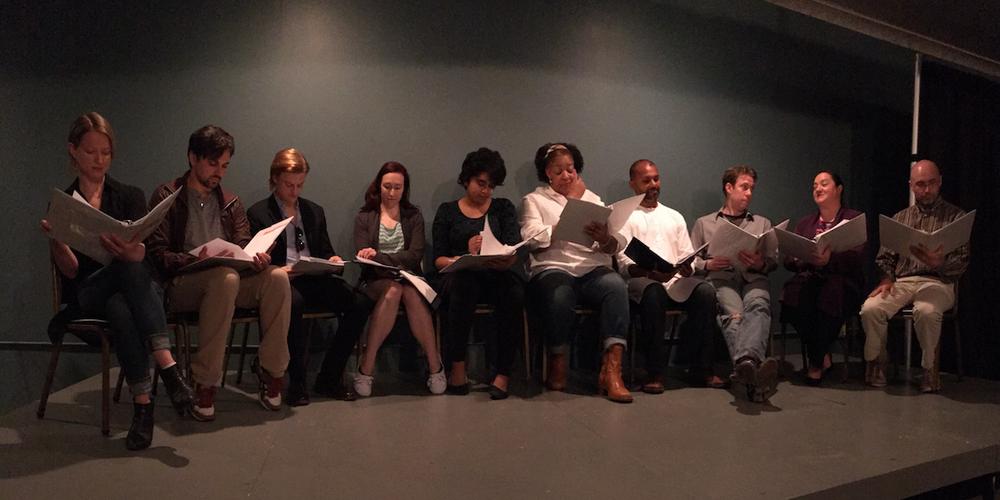
We may not be in a post-racial society yet, but I don’t think reverse racism is the way to get there.
I just read this article regarding racial erasure in Hollywood in the LA Times. And yes, I wholeheartedly agree that Asians should be better represented. And in no way am I condoning the choices (regardless of how fine an actress Scarlett Johansen is, I’m positive the studio could have found, somewhere, an Asian actress to fill the role, positive that it’s not a question of access to talent).
But right now, I’d like to share an experience from way on the other end of the spectrum. I recently watched the staged reading of a play I’d written. This play, Jaathi, is about an Indian American family living in suburban Cleveland. Eight of the nine characters in the play are Indian. And in this play, race matters.
Yet, because of the reality of the theater scene in Cleveland and scheduling difficulties, the reading proceeded with only two of the roles filled by Indians: the protagonist and her father. The rest were filled with talented actors of other races (not to imply in any way that the Indians were not talented; they were awesome).
But an interesting thing happened on the way to my next revision. Discussions of culture, of exclusion and identity, of judgment and society took on more meaning. While second-generation Indians are immune to the racist views immigrant parents often hold, it took having those familiar statements spoken by a non-Indian to shine a light on them. This, I’d argue, is powerful, and much more meaningful than simply clinging to the ideals of racial purity for the sake of equal representation.
I love the way the reading turned out, in no small part because of the racial makeup of the cast. All the actors were incredibly talented, and by all appearances, were able to connect with the emotions and relationships I was striving for in my script (if they didn’t, well, they’re talented enough actors to have feigned it convincingly). One of the (non-Indian) actresses mentioned that the experience of playing the role of an Indian offered her a deeper awareness of this unfamiliar culture, that the insight was heart-wrenching.
And that’s what we really want, isn’t it? My play is about family, something everybody can relate to. It is meant to be universal and familiar. I want it to be approachable, relatable, not just to Indians but everyone. And from what I experienced at the reading, having an international cast in an Indian play achieved just that.
In the end, while the metaphor of children and dolls from the LA Times article is an understandable one, here’s a different edict to consider: Be the change you wish to see in the world. If I want others not to see race, then I can’t see it either. Excluding others because they’re not Indian is just as racist as excluding them because they are.


That’s a nice well-intentioned sentiment, but as a Clinical Psychologist you learn very quickly that Colorblindness is another form of racism/prejudice. Fixing a corrupted system is not “reverse racism.” Many of my filmmaker friends understand the decision and see the long standing broken system. Your experience in running a theater is valid but is a false analogy when viewing the systematic discrimination in Hollywood.
I’m not arguing for colorblindness. In fact, the story cannot be viewed without considering race. In this small case, the history of race relations–of each culture’s racial views—added a layer of meaning to the story. And I think it’s a valuable layer to consider. That’s all. Definitely not meant to condone Hollywood’s whitewashing tendencies.
“If I want others not to see race, then I can’t see it either.” Sounds like you think people are arguing for colorblindness.
I think a lot of what you expressed it kind of confusing. What you did in your production was a good model of what should have been done. Hollywood does the exact opposite. Instead of having minority roles they can’t cast, Hollywood willfully won’t cast. You had a rich multicultural production and even discussed the consolidation of different backgrounds. That’s what critics are calling for. Not sure what “racial purity” you’re saying critics are asking for.
It’s not people are against ScarJo and Ghost in the Shell. It’s the constant pattern that it happens – whether there are good reasons or there’re not. See The Martian (Korean character becomes white character among others), or upcoming Death Note, or Dr Strange; list goes on and on
Plus it seems you think asking for reasonable representation is “reverse racism.” That’s a very passive aggressive way to criticize the critics or blame he victim, if you will and occurs very often as part of the systematic but subtle ways to discriminate.
Maybe I’m wrong, but I think that what the author of this piece is saying is along these lines: you can’t say that everyone should be a part of the conversation, then shut out a group whose personal demographics are similar to those who have been the dominant–even the only–voice in the conversation up to this point. You can’t say that a group of individuals are more than a set of traits that they have no choice over while lumping another group with traits similar to the majority and label them part of “the system” or “the oppressors”, thus stripping them of their individuality and their humanity. You achieve unity by simply redrawing the lines of division.
Or, maybe I read something into the piece that the author never intended.
/shrug